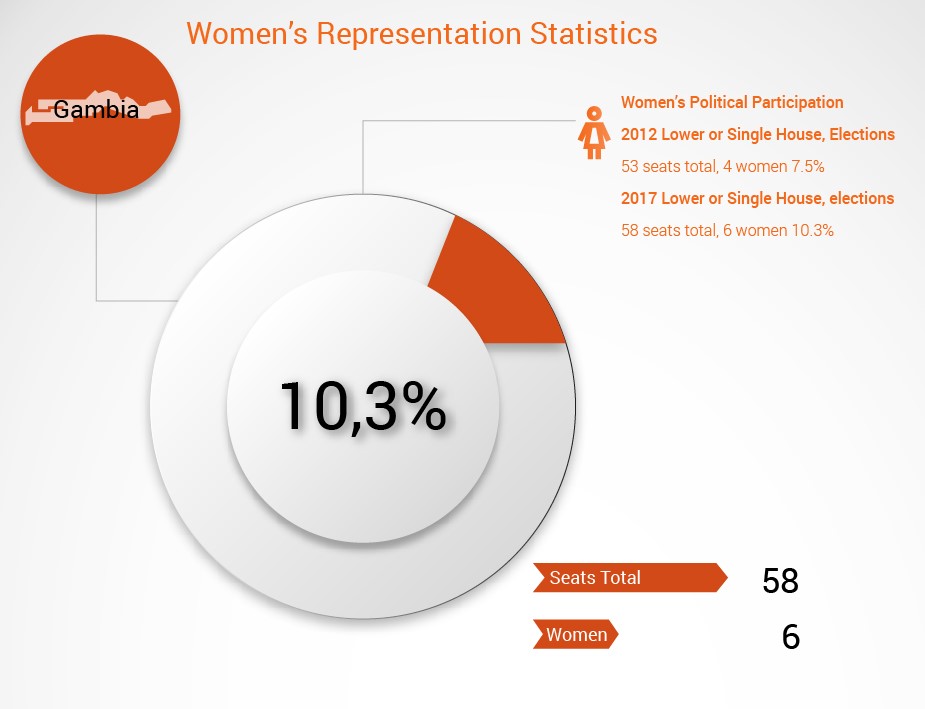Elections for the National Assembly in The Gambia were held on 6 April 2017.
The United Democratic Party won the elections with 31 seats, led by Adam Barrow. These are the first elections since the downfall of Yahya Jammeh, founder of the Alliance for Patriotic Reorientation and Construction (APRC), who seized power in a coup in 1994. In the previous elections on 1 December 2016, Jammeh was defeated by Adama Barrow, who was nominated as the candidate for a coalition of seven opposition parties who were advocating for greater respect for human rights. Although Jammeh initially accepted defeat, he later contested the election results and a political crisis erupted. In January 2017, he finally agreed to step down after 22-years of rule.
The National Assembly is composed of 53 members, with 48 members being directly elected from electoral districts for a five-year term, and 5 being appointed by the President. The National Assembly has one legislative chamber (unicameral). There are nine registered political parties in the Gambia, and 239 candidates were accepted by the Independent Electoral Commission. The seven political parties which constituted Barrow’s cabinet, they all took part in the 6 April elections.
Despite the lack of gender quotas, there were 17 women running, out of 239 candidates. Some of the prominent female candidates running in the elections were: Fatoumata Jallow Tambajang, Mam Jeng, Aminata Correa, Solvieg Jeng, Amie Sillah, Kaddijatou Jabbie, Mariama Saine.
Women’s Political Participation
In the elections for the National Assembly, 6 women were appointed out of 58 seats, resulting in a 10.3% in female representation. There has been a slight increase in political representation from 2012 where 4 women held seats in the National Assembly. Despite the fact that the regional rate of women’s representation in sub-Saharan Africa is 23%, women’s representation in Gambia remains low. Among the prominent female leaders is Fatoumata Jallow Tambajang who now holds the post of Minister of Women’s Affairs. She was a former United Nations Development Programme expert and served as a Minister of Health, Social Welfare and Wommen’s Affairs in Yahya Jammeh’s government.
Gambia has ratified the Convention on the Elimination of All Forms of Discrimination (CEDAW), and the Maputo Protocol. However, the Operational Protocol for CEDAW has not been ratified. Moreover, whilst there is a legal framework prohibiting rape and marital rape, there is no legislation that prohibits domestic violence. Women are also discriminated in legislation that prohibits them inheriting their husband’s property unless they remarry into his family.
Moreover, there are significant obstacles to access to property, education, and employment. Entrenched sociocultural values prevent girls from accessing education, many are victims of child marriage, and Female Genital Mutilation is still rife in Gambia. Maternal mortality ratios in 2015 were at 291 deaths per 100,000 births, which is 3.5 times higher than the regional average ratio in sub-Sahara Africa. In 2005, 65.8% of women were illiterate, and their participation in the labour market is very low.
Conclusion
As it was already mentioned, the election results slightly increased women’s political representation with 10.3% of seats being held by women. Fatoumata Jallow Tambajang has stood out as a leader in women’s representation in the Gambia, and is now Minister of Women’s Affairs giving hope to the possibility of the introduction of more policies that focus on gender equality.
It is obvious that there is greater possibility for women’s political representation and participation. Following this shift, it is urgent that quotas are established and that the democratic institutions are inclusive. Moreover, this must be accompanied by policies that focus on women’s empowerment in all areas of society. The new Minister of Women’s Affairs will need to focus on girl’s education, eradicating all forms of gender-based violence and economic and political participation for the next elections to be more inclusive and representative.

